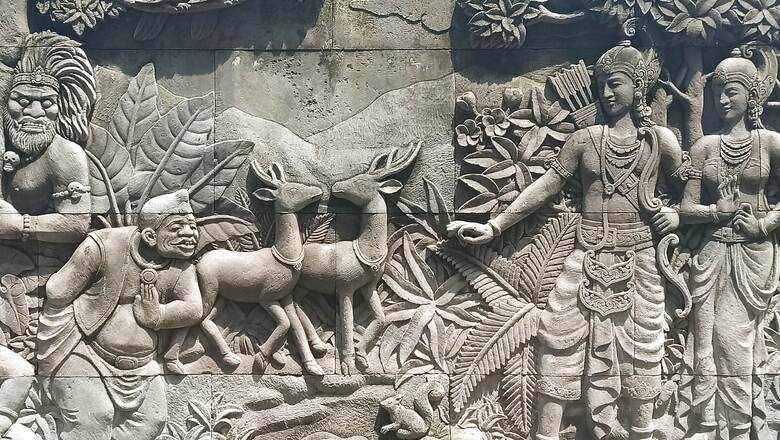
views
Maharishi Valmiki’s Ramayana was arguably the first chronicled history of Bharat. And, Maharishi Valmiki was the first poet who shared accounts and memories of events from the life of Sri Rama by turning them into an epic. He was also the contemporary of Sri Rama.
Maharishi Valmiki was also a learned astronomer. He made sequential astronomical references for important dates related to the life of Sri Rama, indicating the position of planets, zodiac constellations and other stars (nakshatras). Sri Rama was born on January 10, 5114 BC (7123 years ago). As per the Indian calendar, it was the ninth day of Shukla Paksha in Chaitra month.
It is mentioned in Valmiki Ramayana’s Ayodhya Kaand (canto) that King Dashratha wanted to make Sri Rama the king because Sun, Mars and Rahu surrounded his nakshatra and normally under such a planetary configuration, the king dies or becomes a victim of conspiracies. Dashratha’s zodiac sign was Pisces and his nakshatra was Revathi. This planetary configuration was prevailing on January 5, 5089 BC, and it was on this day that Sri Rama left Ayodhya for 14 years of exile. He was 25 years old then.
Valmiki’s Ramayana refers to the solar eclipse at the time of war with Khara and Dushana in later half of the 13th year of Sri Rama’s exile. On the basis of planetary configurations described in various other chapters, the date on which Ravana was killed works out to be December 4, 5076 BC, and Sri Rama completed 14 years of exile on January 2, 5075 BC. Incidentally, that day was also Navami of Shukla Paksha in Chaitra month.
Maharishi Valmiki mentioned the position of stars when Sri Rama was born, the location of sun was in Aries, Saturn was in Libra, Jupiter and the moon were in Cancer, Venus was seen in Pisces while Mars was in Capricorn. It was the ninth day of the increasing phase of the moon in the lunar month of Chaitra.
Pushkar Bhatnagar in his book ‘Dating the Era of Lord Ram’ wrote that these unique astral conditions were present in the sky on January 10, 5114 BC. Pushkar Bhatnagar, an engineer and officer of the Indian Revenue Service, had acquired a unique software from the US in which he entered the relevant details about the planetary positions as mentioned by Maharishi Valmiki and obtained very interesting and convincing results, which determined the important dates starting from the birth of Sri Rama to the date of his coming back to Ayodhya after 14 years of exile.
There is an episode related to Maharishi Valmiki in the Mahabharata period. When the Pandavas win the battle with the Kauravas, Draupadi holds a yajna, for which the blowing of the conch was necessary, but all efforts including Krishna’s could not produce the sound, then everyone prays to Maharishi Valmiki at the behest of Krishna. On the appearance of Maharishi, sound starts emanating from conch shell and Draupadi’s yajna is complete.
In the ancient scripture Vishnudharmottara Purana, Maharishi Valmiki is mentioned as God. It is written that people who want to enhance their knowledge and wisdom should offer prayers to Maharishi Valmiki.
Maharaishi Valmiki’s eminence is not restricted to north of Bharat. There is a temple in Chennai dedicated to Maharishi Valmiki, it is in Thiruvanmiyur. The temple is believed to be the place where Valmiki rested, after finishing the Ramayana. This temple, believed to be over 1300 years old, is under the care of another prominent temple called the Marundeeswarar Temple built during the reign of great Chola Dynasty. As per popular belief, Maharishi Valmiki visited the Marundeeswarar temple to worship Lord Shiva following which the region was named Thiruvalmikiyur, which gradually changed to Thiruvanmiyur.
Dr Saroj Bala, director of Institute of Scientific Research on Vedas, in her latest book ‘Ramayan ki Kahani, Vigyan ki Jubani’ also cross-verified the sequence of astronomical references of epics using planetarium software. She also used open-source software Stellarium to measure the veracity of astronomical references in Maharishi Valmiki’s Ramayana. It was found that the position of the planets and constellations described in Ramayana, the then celestial position, and all the astronomical information were exactly true. The ‘Astronomical Code of the Rig Veda’ listed 63 ancestors of Sri Rama who ruled over Ayodhya. Sri Rama’s ancestors have been traced to King Dashrath, King Aja, King Raghu, King Dilip and so on.
The events and places related to the life of Sri Rama and Sita are India’s true cultural and social heritage. And, their significance in Bharatiya system of values is immense and has remained alive because of the great contribution of Maharishi Valmiki.
The writer holds PhD in Sociology and is senior fellow with Delhi-based think tank Vichar Vinimay Kendra. The views expressed in this article are those of the author and do not represent the stand of this publication.




















Comments
0 comment